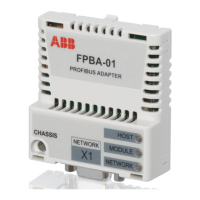Overview
15
Overview
Overview
This chapter contains a short description of the PROFIBUS
standard and the FPBA-01 Adapter module, and a delivery
checklist.
PROFIBUS standard
PROFIBUS is an open serial communication standard that
enables data exchange between all kinds of automation
components. There are three main variations of PROFIBUS:
PROFIBUS FMS (Fieldbus Message Specification), PROFIBUS
DP (Decentralised Periphery) and PROFIBUS PA (Process
Automation).
The physical transmission medium of the bus is a twisted pair
cable (according to the RS-485 standard). The maximum length of
the bus cable is 100 to 1200 metres, depending on the selected
transmission rate (see the chapter Technical data). Up to 31
nodes can be connected to the same PROFIBUS network
segment without the use of repeaters. With repeaters, it is
possible to connect 127 nodes (including repeaters and master
station) to the network.
In PROFIBUS communication, the master station – usually a
programmable logic controller (PLC) – polls the nodes which
respond and take the actions requested by the master. It is also
possible to send a command to several nodes at the same
broadcast; in this case the nodes do not send a response
message to the master.
The PROFIBUS protocol family is specified in the IEC 61158
standard. The communication with a drive is defined in
PROFIdrive-PROFILE – The PROFIBUS Profile for Adjustable
Speed Drives. For further information on PROFIBUS, refer to the
above-mentioned standards.

